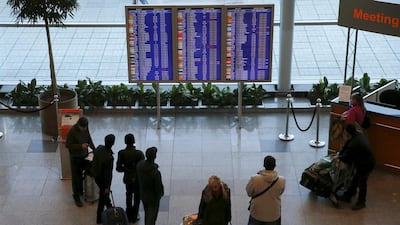MOSCOW // President Vladimir Putin ordered the suspension of all Russian passenger flights to Egypt on Friday until the cause of a deadly plane crash last Saturday has been established.
The move, which follows decisions by Britain and others to suspend flights to and from Sharm El Sheikh, the Egyptian resort where the downed Russian airliner originated, may be the first sign that Moscow is attaching credibility to the theory that extremist militants somehow planted a bomb on the aircraft.
The Kremlin said Mr Putin’s decision to halt flights to Egypt, as well as repatriate Russian citizens there, did not mean the crash was caused by a terrorist attack but was made on the recommendation of his security chief.
“Until we have determined the true reasons for what happened, I consider it expedient to stop flights by Russian aviation to Egypt,” Alexander Bortnikov, the head of Russia’s FSB security service, told an emergency meeting on Friday.
The head of Russia’s federal tourism agency told the Tass state news agency that an estimated 45,000 Russian tourists were currently in Egypt.
Britain’s attempts to bring home an estimated 20,000 British tourists from Sharm El Sheikh were thrown into chaos on Friday when Egypt reduced the number of flights it would allow.
Egypt’s minister of civil aviation, Hossam Kamal, said the requirement that passengers take only their hand luggage with them, with their check-in bags to follow separately, had forced the move as the airport could not cope with all the luggage left behind. Only eight of the 29 planned flights to Britain would leave on Friday, he said.
A first flight took off for London’s Gatwick airport after a long delay, followed shortly by another plane headed for Britain. But there were angry scenes at the airport as thousands of anxious Britons, who had also hoped to fly home, were sent back to their hotels.
The British government authorised flights to resume from the resort on Friday after conducting security checks at the airport.
In a sign of mounting fears about the security of baggage handling in Egypt, Dutch carrier KLM banned check-in luggage on an early flight from Cairo, mirroring moves taken by several European airlines.
An affiliate of the extremist group ISIL has claimed responsibility for the crash, in which the Saint Petersburg-bound jet crashed minutes after taking off. All 224 on board were killed, most of them Russian tourists.
Cairo has sought to downplay any suggestion of an attack.
But US President Barack Obama said: “I think there is a possibility that there was a bomb on board and we are taking that very seriously,” while emphasising it was too early to say for sure.
In London, where David Cameron hosted Egyptian president Abdel Fattah El Sisi on Thursday, the British prime minister told reporters it was “more likely than not that it was a terrorist bomb” that caused the crash.
And The Times newspaper reported on Friday that electronic communications intercepted by British and US intelligence suggested a bomb may have been carried onto the plane.
Satellites uncovered chatter between militants in Egypt’s Sinai Peninsula and Syria, it said.
“The tone and content of the messages convinced analysts that a bomb had been carried on board by a passenger or a member of the airport ground staff,” the newspaper reported, without giving a source.
Egypt’s foreign ministry said the analysis of the black boxes and wreckage was still under way.
“Time should be given for the analysis. The minute that the analysis is ready it will be made public,” a spokesman said.
Egypt had beefed up security at airports to “give confidence to the British government, but that does not mean we concur with any scenario,” he added.
There is no global or European blanket ban and some flights, including all Russian ones before Mr Putin’s order, continued from the airport.
France and Belgium have warned citizens against travelling to Sharm El Sheikh and Britain advised against all but essential travel by air to or from the resort.
Joining a string of airlines in avoiding Sharm El Sheikh, the Lufthansa Group announced its subsidiary Eurowings would halt flights between Germany and the Red Sea resort, while Turkish Airlines also cancelled two flights.
If it was behind the attack, it would be the first time ISIL, which controls large areas of Syria and Iraq, has hit a passenger plane.
The incident has the potential to deeply damage Egypt’s tourism industry, still struggling to recover from a turbulent four years following its 2011 revolution.
After hearing Mr Putin’s decision to halt flights, tourism workers in Sharm El Sheikh reeled in shock at the possible blow to their livelihood.
“It has destroyed the homes,” of those working in the industry, said Ahmed Ghobashi, who works in a resort association to promote tourism.
* Reuters and Agence France-Presse

